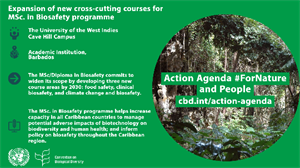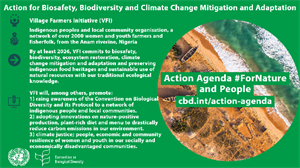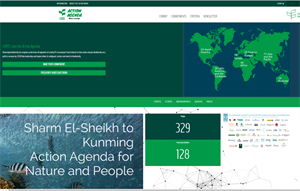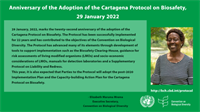.jpg?width=200) |
|
Latest Issue: No. 16 - 2022
Inspiring Quotes:
Experiences and Lessons Learned from Capacity-building Initiatives -
UNEP-GEF Projects
|
-Ms. Elizabeth Maruma Mrema, Executive Secretary, Convention on Biological Diversity, United Nations Environment Programme (UNEP)
 |
|
For over 20 years, many Parties to the Cartagena Protocol on Biosafety have participated in biosafety capacity-building initiatives, in particular the United Nations Environment Programme – the Global Environment Facility (UNEP-GEF) projects. The current issue of the Biosafety Protocol News presents experiences, good practices and lessons learned regarding these projects from different countries. While many Parties have benefited from the UNEP-GEF projects, Parties have also indicated that funds for capacity-building are often limited and insufficient to address all their capacity-needs. With the Government of China’s announcement of the Kunming Biodiversity Fund, and the joint commitment by the GEF, UNEP and the United Nations Development Programme (UNDP), among other commitments, at Part 1 of the UN Biodiversity Conference, additional support to implement the Convention and its Protocols will be in place in the coming years.
Parties to the Cartagena Protocol have acknowledged the need for a specific capacity-building action plan for implementation of the Cartagena Protocol and its Supplementary Protocol on Liability and Redress that is aligned with the draft post-2020 implementation plan for the Protocol. Parties have also decided that the fourth assessment and review of the Cartagena Protocol would be combined with the final evaluation of the Strategic Plan for the Cartagena Protocol (2011-2020). This year, it is expected that Parties at Part 2 of the UN Biodiversity Conference, in particular at the tenth Conference of the Parties serving as the meeting of the Parties, will review the fourth assessment and review of the Cartagena Protocol and the final evaluation of the Strategic Plan for the Cartagena Protocol. Parties are also expected to adopt the draft Capacity-building Action Plan and the draft Implementation Plan for the Cartagena Protocol on Biosafety.
I would like to pay tribute to all the authors who contributed text and photographs to this issue.
Statement: 2021 United Nations Biodiversity Conference Closing statement “Ecological Civilization — Building a Shared Future for All Life on Earth” Kunming, China 15 October 2021 |
-Ms. Milena Roudna, Former Cartagena Protocol on Biosafety National Focal Point, and Ms. Zuzana Doubkova, Head of Biosafety Unit, Ministry of the Environment, Czech Republic
 |
|
The UNEP-GEF Biosafety Development and Implementation Project to develop the National Biosafety Framework in the Czech Republic focused on five main components: 1) Biosafety policy; 2) Regulatory regime; 3) Handling requests for permits; 4) Enforcement and monitoring; and 5) Public information, participation and awareness. Added project component also aimed at developing the National Biosafety Clearing-House (BCH). The project resulted in 29 publications and organized 40 workshops, including experiences shared with other countries (e.g. in international, regional, bilateral side events and training workshops). The main successes also included: 1) Cross-sectoral cooperation to reflect biosafety issues in important national policy, strategic document and legislation; 2) Close cooperation with research centres; 3) Involvement of institutions charged with enforcement; 4) Contact with different non-state institutions and groups to disseminate up-to-date knowledge; and 5) Adopted measures useful in the processes within the European Union, after the Czech Republic became a member. |
-Mr. Marvin Argueta García, Cartagena Protocol on Biosafety National Focal Point and Biosafety Clearing-House Focal Point, Costa Rica
 |
|
Costa Rica, through implementing the Phytosanitary Protection Law from 1997, began the process of establishing its national biosafety regulatory system to regulate living modified organisms (LMOs) for agricultural use. However, ever since the Cartagena Protocol on Biosafety was ratified by Costa Rica, supported by the UNEP-GEF Project, tools and strategies were developed that supported the development of a national biosafety framework. The achievement was in accordance with the interests of the country to maintain a balance between biodiversity protection and development or imports of LMOs. Likewise, the UNEP-GEF project has also resulted in an online platform to exchange information on LMOs for those involved in the decision-making process of LMOs. In addition, regulators and the National Biosafety Technical Commission’s capacities were strengthened in terms of risk assessments of LMOs, including exchanging information with other countries in relation to regulatory experiences. Currently, efforts are focused on updating the regulatory framework in terms of detection and identification of LMOs, public participation in decision-making regarding LMOs, and strengthening capacities of biosafety regarding organisms developed with new breeding techniques, such as , genome editing. |
-Mr. Rufus Ebegba, Cartagena Protocol on Biosafety National Focal Point, Nigeria
 |
|
The UNEP-GEF project in Nigeria contributed to developing and implementing the national biosafety framework with remarkable achievement. One achievement was establishing the National Biosafety Management Agency (NBMA) that develops various guidelines and regulations (e.g. processing food and feed, food safety guidelines). Later, the NBMA was amended to include regulating emerging technologies (e.g. gene drive, gene editing, synthetic biology) that resulted in more guidelines (e.g. guidelines on gene editing, gene stack). Other achievements include developing a national biosafety policy and an action plan, recently approved by the Nigerian government. In the coming years, GEF needs to dedicate a special fund to biosafety to enhance the safe use of biotechnology and for the successful implementation of the Implementation Plan for the Protocol. |
- Ms. Norsham Abdul Latip, Cartagena Protocol on Biosafety National Focal Point, and Ms. Anita Anthonysamy, Biosafety Clearing-House Focal Point, Malaysia
 |
|
In Malaysia, a pivotal outcome from UNEP-GEF project is the Malaysia Biosafety Enforcement Coordination Matrix, a strategic mechanism towards implementing biosafety enforcement activities in a cohesive manner. The Matrix has identified roles of key enforcement agencies for a targeted approach to enhance competence and build capacity in specific needed areas. |
-Mr. Jumamyrat Saparmyradov, Cartagena Protocol on Biosafety National Focal Point, and Ms. Ejebay Kokanova, Biosafety Clearing-House Focal Point, Turkmenistan
 |
|
Turkmenistan has been a Party to the Cartagena Protocol on Biosafety since 2008. In spite of the challenges accessing funds from the UNEP-GEF capacity-building project, Turkmenistan has been able to fulfill its international obligations. Under the Protocol a network of scientific laboratories was created, equipped with modern equipment, for the identification and analysis of GMOs. In addition, named after Oguz Khan (2016) the Turkmen Engineering and Technology University was established with a biotechnology faculty for training specialists. Over the years, the country has developed a number of state-regulated laws to control and ensure the safety of human health and the environment in the context of GMOs. In the coming years, there are a number of biosafety activities that need to be implemented, including the creation of a Coordinating Centre for Biosafety with the involvement of competent experts, capacity development and international cooperation, as well as development of a special law on GMOs. In the future, Turkmenistan recommends that an implementation project of the UNEP-GEF capacity-building project should be initiated to allow the country to further enhance capacities for biosafety activities. |
Main conclusions
The main experiences and lessons learnt are that funds to build capacity for biosafety led to successful development of national biosafety systems to facilitate implementation of the Cartagena Protocol, such as regulations, guidelines, strategies, ongoing events, collaborative initiatives and information materials. Some recommendations were for GEF to provide dedicated biosafety funding for projects.
Useful Information
 Issue 2 of the Action Agenda Newsletter, with biosafety commitments from non-state actors Issue 2 of the Action Agenda Newsletter, with biosafety commitments from non-state actors
 Action Agenda Commitment – Croplife International – Capacity-building Action Agenda Commitment – Croplife International – Capacity-building
 Action Agenda Commitment – University of West Indies – Education and Capacity-building Action Agenda Commitment – University of West Indies – Education and Capacity-building
 Action Agenda Commitment – Village Farmers Initiative – Awareness and Capacity-building Action Agenda Commitment – Village Farmers Initiative – Awareness and Capacity-building
 More commitments on the Action Agenda for Nature and People from non-state actors can be made towards the Global Biodiversity Framework and the Implementation Plan for the Cartagena Protocol on Biosafety / More commitments on the Action Agenda for Nature and People from non-state actors can be made towards the Global Biodiversity Framework and the Implementation Plan for the Cartagena Protocol on Biosafety /
New Action Agenda landing page launched with interactive and informative outreach materials, videos, news sections and navigation components
 Interview: Mr. Pedro Rocha, the Inter-American Institute for Cooperation on Agriculture, on commitments towards the draft Implementation Plan for the Cartagena Protocol on Biosafety Interview: Mr. Pedro Rocha, the Inter-American Institute for Cooperation on Agriculture, on commitments towards the draft Implementation Plan for the Cartagena Protocol on Biosafety
 Capacity-building material: Pocket guide on access to information and public participation regarding LMOs (more languages available)
Notifications: Further information: Resumed sessions of SBSTTA 24, SBI 3 and WG2020-3 Geneva, Switzerland
Selected representatives of indigenous peoples and local communities to receive funding for their participation in the resumed sessions of the Twenty-fourth meeting of the Subsidiary Body on Scientific, Technical and Technological Advice, the Third meeting of the Subsidiary Body on Implementation and the Third meeting of the Open-ended Working Group on the Post-2020 Global Biodiversity Framework
Core Programme Budget of the Cartagena Protocol on Biosafety: Scale of assessment for the apportionment of expenses for 2022
Fourth Call for Proposals under the Bio-Bridge Initiative
Upcoming webinars to support discussions at the resumed sessions of SBSTTA-24, SBI-3 and WG2020-3
Contact information of competent authority to perform the functions set out in Article 5 of the Nagoya – Kuala Lumpur Supplementary Protocol on Liability and Redress
Launch of the new platform of the Biosafety Clearing-House Capacity-building material: Pocket guide on access to information and public participation regarding LMOs (more languages available)
Notifications: Further information: Resumed sessions of SBSTTA 24, SBI 3 and WG2020-3 Geneva, Switzerland
Selected representatives of indigenous peoples and local communities to receive funding for their participation in the resumed sessions of the Twenty-fourth meeting of the Subsidiary Body on Scientific, Technical and Technological Advice, the Third meeting of the Subsidiary Body on Implementation and the Third meeting of the Open-ended Working Group on the Post-2020 Global Biodiversity Framework
Core Programme Budget of the Cartagena Protocol on Biosafety: Scale of assessment for the apportionment of expenses for 2022
Fourth Call for Proposals under the Bio-Bridge Initiative
Upcoming webinars to support discussions at the resumed sessions of SBSTTA-24, SBI-3 and WG2020-3
Contact information of competent authority to perform the functions set out in Article 5 of the Nagoya – Kuala Lumpur Supplementary Protocol on Liability and Redress
Launch of the new platform of the Biosafety Clearing-House
Statistics and Other Information
Results of the survey on Action Agenda/Biosafety:
 Response: What type of non-state actors (e.g. academia, businesses, NGOs, IPLCs) are working on biosafety issues in your country? Response: What type of non-state actors (e.g. academia, businesses, NGOs, IPLCs) are working on biosafety issues in your country?
 Response: How can we raise the profile of Parties and non-state actors' work on biosafety issues online and in meeting? Response: How can we raise the profile of Parties and non-state actors' work on biosafety issues online and in meeting?
New BCH Platform:
 Launch of the new Biosafety-Clearing-House platform
Press release Launch of the new Biosafety-Clearing-House platform
Press release
Commemoration:
 In Memory of Orestes Plasencia (1965 – 2022) In Memory of Orestes Plasencia (1965 – 2022)
Celebration 2022:
 22 Year Anniversary of the Adoption of the Cartagena Protocol on Biosafety, January/February Celebration 22 Year Anniversary of the Adoption of the Cartagena Protocol on Biosafety, January/February Celebration
Recent and Upcoming Biosafety Events

Opening of COP-15 and COP-MOP 10: COP-15 President Huang Runqiu, Minister of Ecology and Environment, China/ Closing plenary of COP-15 and COP-MOP 10: Ms. Elizabeth Maruma Mrema, Executive Secretary of the SCBD (Photo source: IISD/ENB)
The major outcome of Part 1 of the UN Biodiversity Conference, including the tenth meeting of the Conference of the Parties serving as the meeting of the Parties to the Cartagena Protocol on Biosafety, held online from 11 to 15 October 2021, Kunming, China, was the adoption of an interim integrated budget for 2022 for the Convention and its Protocols, and a progress report from the co-chairs of the Open-ended Working Group on the Post-2020 Global Biodiversity Framework. More information is available in the online

Online discussions took place from 27 September to 24 October 2021, with 130 inputs and 604 participants. The discussions promoted and inspired actions from non-State actors towards issues related to biosafety and the protection of biodiversity for the Action Agenda for Nature and People. Discussion outcomes contributed to the implementation of the draft Implementation Plan for the Cartagena Protocol for the next 10 years. As part of the launch of the online discussions, a webinar was held 27 September 2021, in collaboration with the UNDP’s Nature for Life Hub. The webinar aimed to: 1) provide an initial discussion on the importance and features of the Action Agenda for Nature and People to mobilize biosafety commitments from non-State actors; and 2) Strengthen familiarity with the importance of, and guidance to, making a commitment in the Action Agenda. The moderators’ summary of the discussions and the webinar is available at in the forum and the Action Agenda to make commitments on biodiversity and biosafety for non-state actors is available in the Action Agenda platform

The Convention on Access to Information, Public Participation in Decision-making and Access to Justice in Environmental Matters (Aarhus Convention) held a genetically modified organism (GMO) session at the seventh Meeting of the Parties of the Aarhus Convention, 19 October 2021, which included a presentation from the SCBD. The GMO session, among others, aims to review collaboration between the SCBD and the Aarhus Convention as well as to review work on the GMO amendment of the Aarhus Convention. The SCBD provided a statement on information that supported the recommendations by the Chair of the third joint CBD/Aarhus Convention round table on public awareness, access to information and public participation regarding LMOs/GMOs (Geneva, 16–18 December 2019), supported a fourth joint CBD/Aarhus Convention round table as recommended by the Chair of the third round table and promoted the Action Agenda for Nature and People as a resource to advance public participation to galvanize actions from non-State actors. Other statements were from the Chair of the third joint round table highlighting the importance and outcomes of the third joint round table and the joint pocket guide on access to information and public participation regarding LMOs. Finally, a representative from ECOROPA gave a statement urging one more ratification of the GMO amendment to allow its entry into force and the GMO amendment to the Aarhus Convention to be implemented in line with capacity-building, risk assessments and liability and redress of the Cartagena Protocol. The report and statements are available at online

The SCBD organized a webinar on synthetic biology governance and cooperation activities on 2 November 2021. The webinar, moderated by a representative from UNEP, aimed to facilitate discussions and understanding of the perspective of various organizations in relation to synthetic biology, as well as to share information on how synthetic biology is being considered through different lenses. The webinar comprised two parts: one composed of brief presentations from representatives of international organizations sharing information on their activities related to synthetic biology, and a panel section where the representatives of the various organizations had the opportunity to answer questions and interact with a view to further discuss opportunities available to foster collaboration within the field. The webinar saw the participation of representatives from the World Health Organization, the Convention on International Trade in Endangered Species of Wild Fauna and Flora, the Biological Weapons Convention, the International Union for Conservation of Nature, the United Nations Conference on Trade and Development and the SCBD. The webinar recording is available at online.

The Inter-American Institute for Cooperation on Agriculture (IICA) organized the VIII virtual session for COP-MOP Preparation 2021, in which the SCBD held a presentation, on 2 December 2021. The Chair of the session was Mr. Pedro Rocha from IICA. The main aim was to support the delivery and foster the continuous exchange of technical information on issues relevant to countries' biosafety performance under the Convention and the Cartagena Protocol on Biosafety. The SCBD presented an overview of the main outcomes of the online discussions on the Action Agenda and biosafety. A representative from the Vrije Universiteit Brussel, Belgium, presented a brief recap of Part 1 of the UN Biodiversity Conference and upcoming intersessional events prior to Part 2 of the conference. The recording is available online

The SCBD organized a webinar on the new platform for the Biosafety Clearing-House (BCH) held on 7 December 2021. The purpose of the webinar was to introduce the new BCH platform and demonstrate its main features, and to provide an opportunity for users to ask questions on the new BCH. The webinar recording is available online
Upcoming events
Webinar series on science and policy issues related to synthetic biology, 8 February 2022 and 8 March 2022 organized, among others, by UNEP.
Resumed sessions of SBSTTA-24, SBI-3 and WG2020-3, 14 - 29 March 2022 in Geneva, Switzerland.
Launch of the Training Manual on the Detection and Identification of Living Modified Organisms in the Context of the Cartagena Protocol on Biosafety, Biosafety Technical Series No. 5 (Early 2022)
Part 2: Tenth Conference of the Parties serving as the meeting of the Parties, 2022 (Tentative)
CEPA Fair event at COP-MOP 10, Biosafety non-state actors’ commitments to the Action Agenda, 2022 (TBA)
Editors: Ulrika Nilsson Wadzanayi Mandivenyi Johan Hedlund
Photo credit: Czech Republic photo: Milena Roundna Costa Rica photo: Luz Rodríguez Duartes Nigeria photo: Ovinuchi Ejiohuo Malaysia photo: Forestry Department of Peninsular Malaysia Turkmenistan photo: Ministry of Agriculture and Environment Protection of Turkmenistan
Archive: Previous newsletter issues
Subscription: Newsletter subscription
Twitter
Facebook
Disclaimer: The designations employed and the presentation of the material in this publication do not imply the expression of any opinion whatsoever on the part of the Secretariat of the Convention on Biological Diversity concerning the legal status of any country, territory, city or area or of its authorities, or concerning the delimitation of its frontiers or boundaries. The views expressed in this publication are those of the authors and do not necessarily reflect those of the two secretariats, nor does citing of trade names or commercial processes constitute endorsement.
|